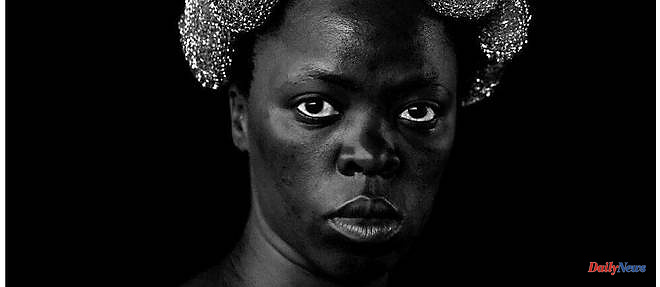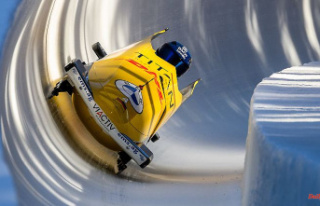Its goal ? Rewrite "a visual history of queer and trans South Africa so the world knows we exist, we resist and we persist". His tool? Photography. Sir Zanele Muholi – as the non-binary artist calls himself –, born in 1972, became a Knight of Arts and Letters in 2017, is invited to the European House of Photography (MEP) for his first retrospective in France.
The exhibition was to come on the heels of that at the Tate in London in 2020, but the Covid-19 decided otherwise. The advantage is to discover, in Paris, the five canvases produced by the artist who, due to the pandemic, could no longer travel the world with his devices and took up acrylics. By the WhatsApp application, at his own pace, before his arrival in France, Zanele Muholi answered our questions.
Le Point: Exhibiting on the African continent and on the European continent, what are the challenges of a first retrospective in France, after London, in your career?
Zanele Muholi: The retrospective on the African continent was a challenge due to many factors, I will name just two: first, identifying and securing an exhibition space that is queer friendly and open LGBTQIA policies [lesbian, gay, bisexual, trans, queer, intersex and asexual, Ed] and, second, the nature of the content presented. In most places in Africa, the rights of LGBTQIA people have been violated by homophobes, transphobes, queerphobes. Sexual orientations and gender expression are banned across much of the continent.
It is therefore difficult for homosexual artists to show their works in public. There is no education or exchange of ideas in the matter, which means there is no progress. Even in South Africa, a country that revised its Constitution in 1996 to protect the LGBTQIA community, the artist is at risk due to many factors, but the most dangerous is misinformation by influential people in high office.
In 2009, my Being series was on display at Constitution Hill – where the Constitutional Court is located – when the then Minister of Arts and Culture walked out because she deemed the series "immoral, offensive and contrary to nation building”. She even called the series pornographic. Such misleading and inflammatory language poses a security problem when it falls into the wrong hands, because ignorance makes people hostile, angry and violent.
This type of scapegoating by public officials, who should not bring their personal feelings into play in the performance of their official duties, also means that gay creators face many obstacles, including denial of funding.
One of the consequences of the silencing of the creators and scholars of the homosexual community is the brain drain. The continent is losing some of the brightest minds who fled their countries for their own safety and their right to express, create and disseminate information. They could have participated in nation-building back home.
This exhibition is taking place in Europe because there is access to space and resources. Europe has paid homage to certain homosexual artists, of which I am one, and to their works, it is welcoming. In these spaces, a lot of information is shared, people read and learn about different topics. But for certain Africans to have access to my work, they must be in the areas where my works are displayed.
I chose two images: Bester V, Mayotte, 2015 and Sthembile, Cape Town, 2012. I chose these visuals because they speak to the Zulu woman. Bester V, named after my mother, is for a woman who tells the world, with her head covered, of her dignity and position in society. For the Sthembile photo, the isicholo [Zulu hat, editor's note], the married woman's hat, serves the same purpose: to communicate to the world that you are no longer a young girl, but that you are taken. Breasts are not meant to objectify or exoticize woman, but are seen as part of the woman who nurtures the future nation.
What has painting brought to your practice? Is this a new area to explore?
Painting existed before photography until it evolved thanks to a new technology, the camera. Painting as a practice has given me a lot, because it helps me to pause and be in touch with myself. When I paint, the visual first manifests in my mind as a photograph. With a photograph, you can shoot many times until you are satisfied. A painting is a monotype. It is an original work that allows me to work with color and brings me personal healing.
I have the option of using color and an additional tool that is different. Although it takes longer, I find it beautiful and amazing - of course, they say beauty is in the eye of the beholder! I liken the painting process to the pains of the time, because they are unspeakable and only those who are in the know feel them.
Only the painter understands the turmoil of the whole process before presenting it to the general public – how his mindset evolved while he was giving birth to this visual beauty, even though others may not find it. beautiful, of course. It doesn't matter to me, because I paint for me.
It allows me to take a break and that's when I'm most with myself, because there is no shortcut in the process. It's like I'm healing and breaking down at the same time. This mixing of paints and the time it takes for each brushstroke to be the right one does something to me.
For me, achievements are not measurable. When I hear "success," I equate it to ultimate success, something that smells delicately good and beautiful. Success is also synonymous with wealth. I'm grateful to still be alive and striving for more because I believe hard work overcomes even more blood, sweat and tears. I continue to present my works in my most authentic voice. I can't measure or compare, but I can say I'm blessed that I've produced work that has been archived and will continue to educate and help others for generations to come.
What are you most busy with right now? A new series?
I never stop working, because my work keeps me sane. I am currently working on a large and exciting project which will be unveiled in Cape Town in May 2023.
Do you have a dream?
Yes, I want to have a museum that will contain art that matters.
“Zanele Muholi” exhibition, the first retrospective in France dedicated to the artist. At the European House of Photography (MEP), 5-7, rue de Fourcy, Paris 4th, from February 1 to May 21.












